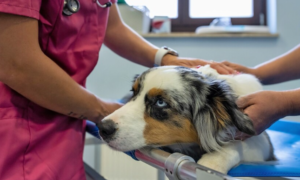Identify the top 5 symptoms and factors responsible for causing serious respiratory ailments in dogs.
According to veterinarians, the increase in instances of unconventional canine respiratory disease may be attributed to various factors, including a reduction in vaccination rates.

These symptoms include:
Snorting, sneezing and other signs of breathing problems
Discharge from the nose and eyes
Foaming at the mouth
Weight loss and loss of interest in food
Fatigue or listlessness
Fever
Coughing (either dry or productive), gagging or retching
Veterinarians nationwide are working diligently to address the growing cases of dogs affected by a severe respiratory illness. Concurrently, scientists are actively investigating the cause of the current outbreak, its extent, and the number of previously healthy dogs that have experienced serious illness or mortality.
Canine respiratory infections, particularly cases of dog flu, are frequently observed and can result in outbreaks in shelters and doggy daycares. The current upsurge has been spreading in various regions of the U.S. and Canada over the past year. This particular outbreak stands out from routine respiratory illnesses, as experts note a significant increase in cases severe enough to lead to pneumonia.
In Colorado, the incidence of canine pneumonia cases saw a 50% increase from September to November of the current year compared to the same period in 2022, as reported by infectious disease expert Dr. Michael Lappin, director of the Center for Companion Animal Studies at the Colorado State University School of Veterinary Medicine. According to Trupanion, a pet insurance company, their claims data indicates a growing number of dogs experiencing severe respiratory illness in multiple states.
Is this a new pandemic in animals especially for dogs?
There are several potential explanations for the increase. The rise in cases could be attributed to a decline in dogs’ resistance to infections, possibly stemming from pandemic-related restrictions that limited their access to daycares or boarding facilities, reducing exposure to circulating viruses or bacteria, as highlighted by experts. Additionally, there are reports indicating a decrease in canine vaccination rates. A recent study revealed that almost half of dog owners express hesitancy towards vaccinating their pets.